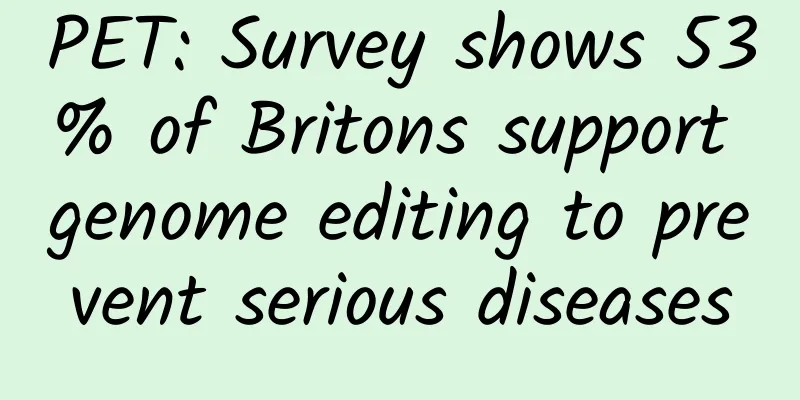PET: Survey shows 53% of Britons support genome editing to prevent serious diseases

|
The Ipsos poll, commissioned by fertility and genomics charity Progress Educational Trust (PET), found that 53% of people support using human genome editing to prevent children from developing serious diseases such as cystic fibrosis. According to the survey, Britons were less enthusiastic about using the technology to prevent milder conditions such as asthma, with just 36% in favour, while only one in five supported the creation of designer babies, but views on the technology varied greatly by age. Younger generations are far more in favor of "designer babies" than older ones, with 38% of 16 to 24-year-olds and 31% of 25 to 34-year-olds supporting the use of gene editing to allow parents to choose characteristics such as their child's height, eye and hair color. Genome editing of embryos used to carry out pregnancy is illegal in the UK and many other countries, but those restrictions could be lifted if research shows the technique can safely prevent serious diseases. Genome editing has been hailed as a potential game-changer in tackling a range of genetic diseases, including cystic fibrosis and muscular dystrophy as well as Tay-Sachs disease, a rare disorder that progressively destroys the nervous system. In principle, the faulty genes that cause these diseases could be rewritten in IVF embryos, allowing them to develop into healthy babies. Despite the tremendous progress in the field, work still needs to be done to perfect genome editing and ensure it doesn’t cause unintended changes to DNA, which would affect every cell in a child’s body and potentially be passed on to future generations because the edits would be made in the embryo. In 2018, researcher He Jiankui provoked global condemnation when he announced he had attempted to edit the genomes of two baby girls in hopes of making them immune to HIV. He was later jailed for violating medical regulations. The furor led to an international committee convened by Britain’s Royal Society and others, which concluded that genome editing is far from ready for clinical use. In a report on its findings, the PET said that if genome editing is used for medical purposes it must be done in a "scientifically and ethically rigorous manner". The authors said it was "alarming" that younger people were more likely to be open to editing of the human genome for preferred traits, such as eye and hair color. "These views warrant attention, but we should continue to prioritize medical needs first," they wrote. John Harris, emeritus professor of bioethics at the University of Manchester, said he supported parents having the "widest possible choice" in selecting their children's physical characteristics if those characteristics themselves were not harmful. "I think there is nothing wrong in principle with engineering traits into our children that are harmless or better than they already are, if we can," he said. "If there is nothing wrong with wishing for a brown-eyed girl, how can it be wrong to implement that wish if you have the power to do so? We are ready to cry eugenics when people want to exercise innocent preferences." Two-thirds of people think the NHS should provide fertility treatment for both infertile people and those trying to conceive, according to a nationally representative survey of 2,233 UK adults, but the report notes that access to free IVF remains "postcode luck medical care". Support was highest for childless heterosexual couples at 49%, while just 19% were in favour of the NHS providing fertility treatment for singles or transgender people. “It is disappointing that, despite sex discrimination being illegal in the UK, attitudes to family structure remain traditional,” said Professor Alison Murdoch, chair of the British Fertility Society. “The better news, however, is that most people do not seem to be opposed to IVF – a significant change from 40 years ago. IVF is now a routine procedure, so why doesn’t the NHS give people a chance?” From cnBeta.COM |
<<: Discover the value of ACG creation. Who will be the ACG IP incubator?
>>: AlixPartners: Electric vehicles are expected to account for 33% of global car sales in 2028
Recommend
Is it just games that WeWhale is trying to grab in the e-sports market again by taking advantage of NEST2015?
As Internet companies and traditional home applia...
If you could put a "deadline" on a cell phone, the manufacturer would say: "Three years!"
If a time limit is set for the happy life between...
If Russell were alive today, he would probably tear up WeChat
[[155156]] "The ability to spend leisure tim...
Yellow warning! Heavy to severe snow in parts of Liaoning and Jilin, heavy snow in some areas, please take precautions against cold and slipping
Yesterday (January 26), some areas in Liaoning an...
The grayscale mask of the post-production technique course of Liangzhijuku Photography, advanced adjustment techniques in the post-production field of landscape photography
The grayscale mask of the post-production techniq...
Is it really that easy to follow hot topics? Understand the correct way to follow hot topics in one article!
How to follow hot topics, what is the significanc...
Lessons from Samsung’s defeat to Apple: Will it repeat Nokia’s mistakes?
On August 1, according to a report from BI Chines...
How to keep her energy job? She looks for oil in shale cracks
Your browser does not support the video tag Oil i...
How much does it cost to create the Yichun flash sale mini program? Yichun flash sale applet production price inquiry
The factors affecting the quotation of Yichun fla...
Inventory and introduction of the top ten experiences of new club consumption reservations in Kunming Tea Drinking Forum in 2022
An inventory of the top ten experiences of the ne...
How to operate Zhihu circle? A complete review of the increase of 2000+ followers in one week!
Many things are about money, but also not about m...
How to acquire the first batch of seed users when you have no money, no people, and no fame?
In the early stages of a business , when you are ...
Interesting open source projects in the field of artificial intelligence and machine learning
This article briefly introduces 10 open source pr...
The Economist: In January 2024, the rise of DeepSeek triggered a boom in China's AI industry, and the Hang Seng Technology Index rose by more than 40%.
The Economist published an article titled "T...
Changsha Tea Tasting Peripheral Reliable Recommendation
Content: Changsha New Tea website appointment arr...









